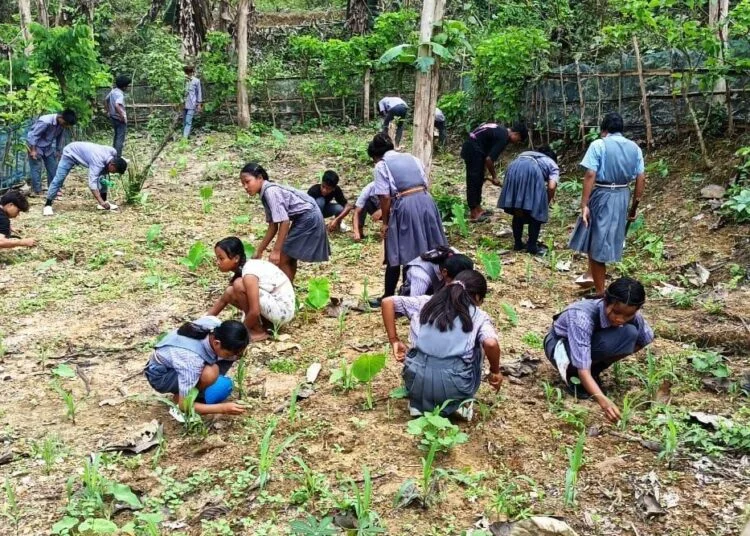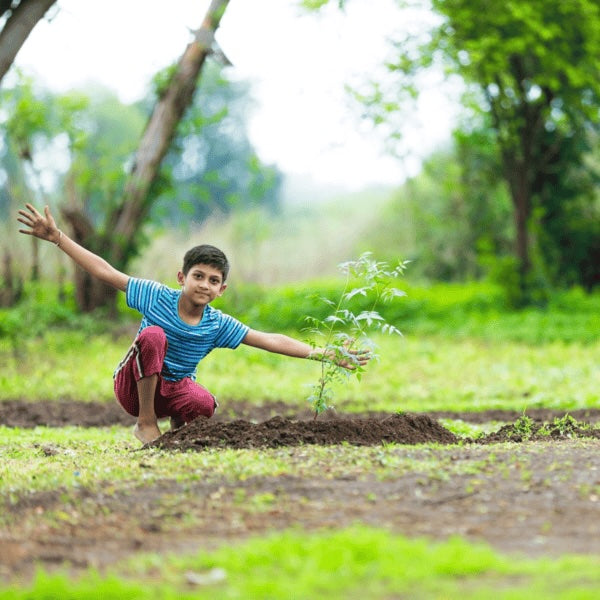

🌾 1. A Seed of Change: What Is Poshan Vatika? Poshan Vatika, meaning “nutrition garden,” is not just a patch of greenery—it's a silent revolution blooming in the heart of India. Spearheaded under the Poshan Abhiyaan (National Nutrition Mission) and l Read more
Trending
Trees for Corporates
Nutri-Garden Revolution: How Poshan Vatika is Growing a Healthier, Gre
🌾 1. A Seed of Change: What Is Poshan Vatika?
Poshan Vatika, meaning “nutrition garden,” is not just a patch of greenery—it's a silent revolution blooming in the heart of India. Spearheaded under the Poshan Abhiyaan (National Nutrition Mission) and later strengthened by Mission Poshan 2.0, these gardens are being nurtured across Anganwadi centers, schools, and community lands.
They aim to grow a variety of vegetables, fruits, herbs, and medicinal plants that address malnutrition, micronutrient deficiencies, and promote dietary diversity—one garden at a time. 🌿🥦🍋
📜 2. Rooted in History and Tradition
The concept of kitchen and medicinal gardens is deeply embedded in India’s ancient Vrikshayurveda system, which promoted cultivating plants not only for food but for healing and spiritual well-being.
Today, Poshan Vatikas are reviving these traditions in modern ways—thanks to collaborations with Ayush ministries, tribal schools, and rural self-help groups. From Brahmi to Tulsi, ancient plants are reclaiming their space in our diets and gardens.
🧪 3. What Grows in a Poshan Vatika?
A typical Poshan Vatika grows:
🥬 Leafy Greens – Spinach, Methi, Amaranth, Bathua
🍅 Vegetables – Tomato, Brinjal, Okra, Bottle Gourd
🌿 Herbs & Medicinal Plants – Tulsi, Giloy, Brahmi, Aloe Vera
🍋 Fruits – Lemon, Amla, Papaya, Pomegranate
🌱 Millets & Creepers – Ragi, Pumpkin, Bitter Gourd
These foods are rich in iron, folic acid, vitamin A, C, calcium, and dietary fiber, essential for combating malnutrition and boosting immunity.
🌟 Fun Fact: A 150 sq. meter nutri-garden can meet the yearly vegetable needs of a family of 4–5 people!
🧠 4. The Science Behind the Soil
Let’s talk nutrition science!
💡 Why it matters:
-
Over 149 million children worldwide are stunted, and 45 million are wasted—many due to micronutrient deficiencies.
-
India carries a high burden of hidden hunger—a condition where food is available, but nutrition is lacking.
-
Poshan Vatikas directly address these gaps with fresh, seasonal, and diverse crops.
Studies show families with nutri-gardens consume 33% more vegetables and fruits than others. These gardens also help reduce anemia, improve hemoglobin levels, and fight undernutrition in women and children.
🌍 5. Environmental Benefits: Growing Green, Living Clean
🌱 Eco Impact of Poshan Vatikas:
🌼 Reduces carbon footprints—by cutting food transportation and plastic packaging
♻️ Encourages organic composting, natural fertilizers, and chemical-free practices
🌸 Boosts local biodiversity—with traditional and indigenous crops
🌧️ Helps recycle greywater and improves soil health
These micro-ecosystems are not only nourishing people but also healing the planet. Think of them as mini green lungs that are easy to replicate and scale.
👩🌾 6. Women at the Root: Empowerment Through Gardens
A powerful but often overlooked benefit—women's empowerment.
🌻 Poshan Vatikas offer:
-
A chance for rural women to earn from surplus produce 🌽
-
Training in sustainable agriculture & health awareness 👩🏫
-
Ownership of community resources 👩🌾
In many villages, women-led SHGs (Self Help Groups) are the backbone of these gardens. They decide what to grow, manage harvests, and even run small businesses from their yields.
🏡 7. Real Stories from Rural India
🟢 Jharkhand: Women in tribal communities turned backyard nutri-gardens into income sources. Now, they supply greens to local Anganwadis and earn ₹1500–₹3000/month.
🟢 Odisha: An Anganwadi worker turned her entire center into a nutrition hub with vertical gardens, water harvesting, and herbal beds. The children there now eat spinach and amla straight from the soil.
🟢 Maharashtra: A group of schoolgirls started a garden in their schoolyard, reducing absenteeism and increasing their interest in science and biology through hands-on farming!
🧑🏫 8. Learning to Grow: School + Soil = Superpower
School Poshan Vatikas aren’t just feeding kids—they’re teaching them life skills:
📚 Biology + Botany – Learning through doing
🥦 Healthy Habits – Eating what they grow
💧 Water Conservation – Using recycled water
🌿 Sustainability – Composting, mulching, and seasonal farming
This is the kind of experiential education that builds responsible, environment-conscious citizens.
🛠️ 9. Implementation & Support
✅ Poshan Vatikas are supported by:
-
Ministry of Women and Child Development
-
Ministry of Ayush
-
Ministry of Agriculture
-
MNREGA for land preparation and fencing
-
National Horticulture Board for seed kits
-
Anganwadi workers for awareness and training
Over 4.3 lakh Vatikas have already been established and more than 1 lakh medicinal saplings planted. And this is just the beginning. 🚀
📊 10. Measurable Impact
🟢 Higher Dietary Diversity: Families with gardens consume 2x more fruits and vegetables.
🟢 Cost Savings: Monthly grocery savings up to ₹500–₹1000 per family.
🟢 Improved Health: Reduction in anemia, better digestion, improved immunity reported.
🟢 Climate Resilience: In drought-prone areas, these gardens serve as nutrition reserves.
🎉 11. Fun, Surprising Facts
🌽 The amaranth plant grown in most Vatikas has twice the calcium of milk.
🍋 Lemons from a small Vatika can meet 100% of a family's vitamin C needs for a month.
🌿 Brahmi, often planted in shady corners, has shown to boost memory and reduce stress when consumed regularly.
🍆 Many Vatikas use multilevel growing techniques—creepers on fences, tubers underground, herbs in pots—maximizing space.
🚧 12. Challenges in the Soil
While the vision is bright, challenges remain:
🚱 Lack of water in arid regions
🚫 Resistance to new crops or practices due to cultural beliefs
📉 Poor training for maintenance
🧺 Seasonal pests and lack of composting knowledge
💼 Inconsistent inter-departmental coordination
But with the right training, community buy-in, and digital monitoring—these can be turned into opportunities.
🚀 13. What’s Next: The Future of Nutri-Gardens
To grow the Nutri-Garden Revolution, India needs to:
🌾 Encourage every school, household, and urban colony to create a kitchen or terrace garden
📲 Use digital tools (apps, QR-based training) to support gardeners
👩🍳 Link gardening with cooking classes and recipe awareness
🏙️ Promote urban nutri-gardens in balconies and rooftops
📦 Include seed kits in government rations or health schemes
Imagine a future where every Indian home has a living grocery store outside the kitchen window! 🌼
🌈 14. Final Words: Growing Health, One Seed at a Time
The Nutri-Garden Revolution through Poshan Vatikas is quietly transforming India. It's fighting hunger, nurturing health, uplifting women, educating children, and greening the land.
It’s not just a garden.
It’s a living classroom, a pharmacy, a kitchen, and a symbol of self-reliance—all rolled into one.
🌿 From soil to soul, this is a movement every Indian can be proud to sow, grow, and share.
You may also like
Corporate Plantations
Nutrition Garden Benefits
Boosts immunity, slashes grocery bills, and grows fresh, pesticide-free veggies right in your backyard.
Kitchen Gardening for Nutrition
Turns your home into a health hub by growing daily greens full of essential nutrients.
Poshan Abhiyaan India
India’s flagship mission fighting malnutrition with grassroots solutions like community nutri-gardens.
Home-Based Nutri-Gardens
Compact, cost-effective gardens that turn balconies and backyards into vitamin factories.
Organic Gardening India
Say no to chemicals and yes to nutrient-dense, eco-friendly harvests straight from your soil.
Women Empowerment Through Gardens
Puts power in the hands of women with income, food security, and decision-making from soil to supper.
Sustainable Agriculture India
Grows food while healing the planet with eco-friendly, water-saving, and low-carbon practices.
Medicinal Plants in Nutri-Gardens
Combines kitchen and Ayurveda with herbs like tulsi, brahmi, and giloy for everyday wellness.
School Nutrition Gardens
Teaches kids nutrition, sustainability, and responsibility one plant at a time.
Anganwadi Nutrition Initiatives
Delivers health and education to children through mini-gardens grown at local Anganwadi centers.
Food Security and Nutrition
Builds local resilience by ensuring every household can grow its own fresh food supply.
Climate-Resilient Gardening
Adapts to changing weather by growing hardy, low-input crops that thrive in every season.
FAQ
What is a Poshan Vatika?
It’s India’s green answer to malnutrition—a small nutrition garden packed with veggies, fruits, and herbs grown at homes, schools, or Anganwadis to boost health and immunity naturally.
How does a nutri-garden improve nutrition?
It serves up a daily dose of vitamins and minerals fresh from the soil—no preservatives, no pesticides, just pure, edible wellness.
Who can start a Poshan Vatika?
Anyone with a patch of soil, a pot, or even a rooftop—kids, parents, teachers, or grannies—can join the Nutri-Garden Revolution from anywhere.
What crops are grown in nutri-gardens?
Expect leafy greens, veggies, herbs, and fruits like spinach, amla, giloy, and tomatoes—basically a plant-powered vitamin buffet.
Is it expensive to set up a nutrition garden?
Not at all—it’s more budget-friendly than weekly grocery runs and pays you back with fresh produce, good health, and zero delivery charges.
Can nutri-gardens work in urban spaces?
Absolutely! From window boxes to terrace beds, even city slickers can grow superfoods in small, sunny spots.
What is the link between Poshan Vatika and Poshan Abhiyaan?
Poshan Vatika is a leafy branch of the Poshan Abhiyaan tree, turning nutrition policy into delicious, homegrown reality.
Are Poshan Vatikas environmentally friendly?
They’re like nature’s best friend—reducing food miles, promoting organic practices, and turning scraps into compost gold.
Can these gardens help during climate change?
Yes, they’re mini climate warriors—resilient, water-wise, and always ready to feed you come rain or shine.
How do schools benefit from nutrition gardens?
They become edible classrooms where kids learn science, sustainability, and healthy eating between bell rings.
How do nutri-gardens empower women?
From seed to sale, women lead the way—growing food, feeding families, and even turning harvests into income streams.
Where can I get help to start one?
Local Anganwadi centers, agriculture departments, or even a quick Google search will guide you to your first green masterpiece.
Most Popular
Connect with us
-
👥 Corporates
If you are looking for:
- 🌲 Tree Plantation Events
- 📊 CSR Projects
📧 corporate@growbilliontrees.com
📞 +91 9699723523
💬 +91 9370599291 WhatsApp (Only)
🕒 Mon - Sat | 10am - 7pm IST
-
🧩 Tree Plantation NGOs
If you are looking for:
- 💰 Financial Assistance
- 🤝 Operational Support
📧 support@growbilliontrees.com
📞 +91 9699723523
💬 +91 9370599291 WhatsApp (Only)
🕒 Mon - Sat | 10am - 7pm IST
-
🌼 Individuals
If you are looking for:
- 👥 Group Tree Plantation Drive
- 🌳 Bulk Tree Plantation
📞 +91 9699723523
💬 +91 9370599291 WhatsApp (Only)
🕒 Mon - Sat | 10am - 7pm IST













